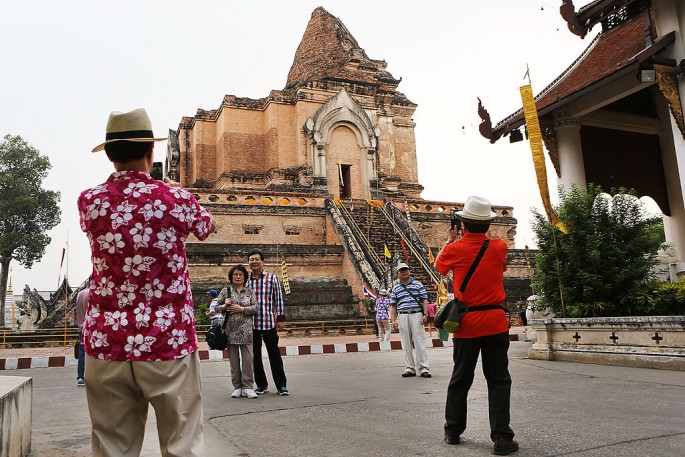A number of Chinese tourists have been affected by travel and entertainment restrictions imposed by Thailand following the death of King Bhumibol Adulyadej on Thursday, Oct. 13, a Global Times report said.
The Thai government has urged people to wear black and to avoid organizing festive events, such as shows and sports events, for 30 days, the report said.
Tourist destinations such as the Grand Palace and Wat Phra Kaew, have temporarily closed their doors to visitors.
About 98 percent of some 50 Chinese randomly interviewed by Global Times from different cities across the country, said that Thailand's 30-day restrictions on entertainment has affected them.
"I respect the suggestion to wear dark clothes. But for me, if I cannot wear bright suits and take photos when I travel to a foreign country, I would rather not go there," Tang Ting, a 20-something office worker in Beijing, told the Global Times. "Maybe I will choose to travel to Thailand one year later," she added.
Some Chinese expressed concern about conditions in Thailand while most of them said that they would not travel to the country but later travel in the future.
Chinese tourists were affected by the closure of some major tourist sites and the suspension of shows and night-time entertainment, Zhu Zhengyu, a tourism analyst at Beijing-based market consultancy Analysys International, said.
"Sightseeing and island tours are the main attractions for Chinese tourists in Thailand, and the unavailability of some activities will affect people's itineraries," Zhu told the Global Times.
But some of Thailand's tourist agencies such as online tourism and ticket-booking site lvmama.com have provided tourist with alternatives, by replacing visits to the Grand Palace with options such as Safari World in Bangkok and the Ancient Siam miniature world.
"The travel package that covers Pattaya is the most affected, while itineraries covering Phuket Island and Chiang Mai are less affected," Ni Jiali, general manager of lvmama.com's overseas travel business, said in an e-mailed statement.
Thailand is a top destination for Chinese who prefer to avoid peak travel seasons, Ni said, citing the company's report.
Reports said that about 280,000 tourists from the mainland visited Thailand during China's National Day holidays in the first week of October.
"The situation in Phuket Island is normal so far. People can be seen wearing any color of clothing, but music is banned in bars," Zheng Jiulin, a tourist from Guiyang, Guizhou Province, currently taking an eight-day trip in Phuket Island, said.
"From what I observed in recent days, about 30 percent to 40 percent of foreign tourists are from China," Zheng added.
A report by chinanews.com in February said that about 7.93 million Chinese tourists visited Thailand in 2015, an increase of 91.62 percent from the previous year. In terms of visitor number, China is currently the largest tourist market for Thailand.
"With the upcoming peak season for travel time in Thailand, the number of tourists visiting Thailand is still expected to grow significantly. The long-term potential of Thailand's tourism sector is closely related to the country's stability. If Thailand is stable and secure, its tourism is still promising," Zhu said.



























